|
|
|
Sort Order |
|
|
|
Items / Page
|
|
|
|
|
|
|
| Srl | Item |
| 1 |
ID:
084921
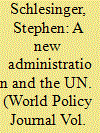

|
|
|
| 2 |
ID:
125643
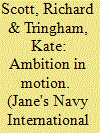

|
|
|
|
|
| Publication |
2013.
|
| Summary/Abstract |
The rebuilding of the Turkish naval forces command's specialist amphibious shipping capability is running hand in hand with efforts to develop the indigenous maritime industrial base.
|
|
|
|
|
|
|
|
|
|
|
|
|
|
|
|
| 3 |
ID:
120547
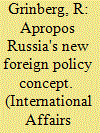

|
|
|
|
|
| Publication |
2013.
|
| Summary/Abstract |
THE FAST CHANGING international situation requires Russia's flexible and timely reaction to the new challenges and threats to its security that arise in the process of the constant evolution of the entire system of modern international relations. At the same time, the Russian Federation, too, is in the process of transformation; it is acquiring new possibilities for an effective response to these challenges and threats; the structure of its national security interests is changing, which should find its reflection in Russia's new foreign policy concept. It is therefore not surprising that among the first decrees V.V. Putin signed after his inauguration as the president of Russia is the decree "On Measures to Ensure the Realization of the Russian Federation's Foreign Policy Course" that instructed the RF Foreign Ministry to present a new draft of the RF foreign policy concept. This will be the country's fourth foreign policy concept since the disintegration of the USSR 21 years ago.
|
|
|
|
|
|
|
|
|
|
|
|
|
|
|
|
| 4 |
ID:
097189
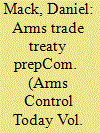

|
|
|
| 5 |
ID:
185559
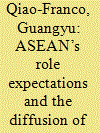

|
|
|
|
|
| Summary/Abstract |
This article examines the diffusion of the principle of ‘common but differentiated responsibilities’ (CBDR) from the United Nations (UN) to the Association of Southeast Asian Nations (ASEAN). Despite its varying interpretations in international negotiations since the 1992 United Nations Framework Convention on Climate Change (UNFCCC), CBDR’s meaning hardly experienced any change in ASEAN. ASEAN’s different interpretation of CBDR from the UN matched the unchanging internal and external role expectations of ASEAN, which were a product of member states’ learning and conditioned by cognitive priors in the region. Cognitive priors in the climate change context included the ‘ASEAN Way’ of collaboration and member states’ deep-seated aspirations for development. The empirical study shows that internally, ASEAN acted as an interactive space for information exchange and a relationship facilitator; externally, it has embraced the position as the voice amplifier for member states in international negotiations. Maintaining the UNFCCC version of CBDR tallied well with ASEAN’s role expectations to: 1) provide member states with room to develop national actions that meet their respective priorities (internal); and 2) put member states in a better position to defend their interests in negotiating adaptation and mitigation responsibilities with extra-regional states (external).
|
|
|
|
|
|
|
|
|
|
|
|
|
|
|
|
| 6 |
ID:
153710
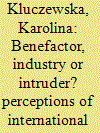

|
|
|
|
|
| Summary/Abstract |
Soon after the breakdown of the Soviet Union in 1991, a civil war started in Tajikistan (1992–97). This was also the period when a number of international organizations arrived in the country to distribute humanitarian assistance and assist in conflict resolution and stabilization. After the UN, the Organization for Security and Co-operation in Europe (OSCE) was the second key organization which appeared in the conflict-stricken country. Like other key international organizations in Tajikistan, the OSCE, which has been in the country since 1994, has seen a shift in its original functions of monitoring and emergency assistance. Some see its avowed objectives in the new century as formalistic, virtual and ineffective. By capturing perceptions of foreign assistance to Tajikistan among employees of the OSCE and other international organizations, NGO workers, government officials and ordinary citizens, this article explores how Tajikistan ‘socialized’ the OSCE, making the organization simultaneously a benefactor, an industry and even an intruder.
|
|
|
|
|
|
|
|
|
|
|
|
|
|
|
|
| 7 |
ID:
184661
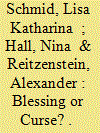

|
|
|
|
|
| Summary/Abstract |
Earmarked funding to international organizations (IO s) has increased significantly over the past two decades. International relations scholars have examined the causes of this trend, but know less about its effects on UN entities. This article identifies different types of earmarked funding, varying from low to high discretion delegated to IO s. Secondly, it examines trends in the UN Development Programme and UN Children’s Fund and finds that both have significant proportions of earmarked funding with low discretion. Drawing on thirty interviews, the article notes four implications of tightly earmarked financing: 1) higher transaction costs for IO s; 2) less predictable funding; 3) overhead costs that are rarely covered; and 4) increasing competition for financing. Overall, the article highlights that earmarked financing exists on a spectrum from tight to minimal control by donor states, and this has important implications for multilateralism.
|
|
|
|
|
|
|
|
|
|
|
|
|
|
|
|
| 8 |
ID:
174230
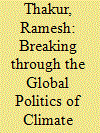

|
|
|
|
|
| Summary/Abstract |
In preparation for the UN discussions in September and the Madrid climate conference in December, a spate of reports warned that the natural environment and ecological systems that sustain all forms of life are collapsing. 1 Laurie Laybourn-Langton, lead author of a report from the Institute for Public Policy Research (IPPR) in February 2019, wrote that “the environment is breaking down, with consequences which include more drought, famine, forced migration and war. Environmental breakdown poses a catastrophic risk.”
|
|
|
|
|
|
|
|
|
|
|
|
|
|
|
|
| 9 |
ID:
051418
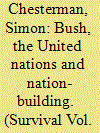

|
|
|
|
|
| Publication |
2004.
|
| Description |
p101-116
|
| Summary/Abstract |
Would greater UN involvement have avoided any of the mistakes made by the Coalition Provisional Authority (CPA) in administering Iraq? Three of the most egregious errors – failing to provide for emergency law and order, disbanding the Iraqi army and blanket de-Ba'athification – ran counter to lessons from previous operations. But the greatest mistake by US planners may have been the assumption that previous UN nation-building efforts have achieved limited success because of UN incompetence, rather than because of the inherent contradictions in building democracy through foreign military intervention. The United States is now engaged, in Afghanistan and Iraq, in two of the most ambitious nation-building projects in its history. The US took a predominant role in part because of the circumstances in which the two conflicts commenced, but also as an extension of the present administration's more general suspicion of multilateral institutions such as the United Nations. This suspicion now undermines the chances of either operation concluding successfully.
|
|
|
|
|
|
|
|
|
|
|
|
|
|
|
|
| 10 |
ID:
101526
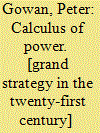

|
|
|
|
|
| Publication |
London, VERSO, 2010.
|
| Description |
xviii, 254p.Hbk
|
| Standard Number |
9781844676200
|
|
|
|
|
|
|
|
|
|
|
|
Copies: C:1/I:0,R:0,Q:0
Circulation
| Accession# | Call# | Current Location | Status | Policy | Location |
| 055577 | 909.831/GOW 055577 | Main | On Shelf | General | |
|
|
|
|
| 11 |
ID:
144960
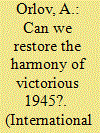

|
|
|
|
|
| Summary/Abstract |
THE 70TH ANNIVERSARY of the United Nations Organization is an international event of signal importance. Set up as a fundamental element of the international system, the UN remains its cornerstone with no alternatives no matter what its numerous critics are saying in chorus. Today amid the disarray and contradictions of the contemporary world, mankind, if confronted with the task of setting up a universal international structure to preserve peace and security, would have come up with an indifferent result if not a failure. Critics concentrate at individual aspects of the UN activity and talk about details: they stand too close to be aware of the grandiose panorama of this construction, hence their attention to arches and façades
|
|
|
|
|
|
|
|
|
|
|
|
|
|
|
|
| 12 |
ID:
125267
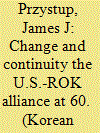

|
|
|
|
|
| Publication |
2013.
|
| Summary/Abstract |
It is important to recognize how successful the U.S.-ROK Alliance has been for the past sixty years in deterring North Korea from attempting to unify the Korean Peninsula by force. This paper addresses Korea's unique status and examines its strong presence in meeting commitments to the international community. The future will require alliance-based cooperation with international partners to address challenges posed by the proliferation of WMD, which is one among many. In the end, however, the U.S.-ROK Alliance will only grow stronger, enhancing stability and security on the Peninsula.
|
|
|
|
|
|
|
|
|
|
|
|
|
|
|
|
| 13 |
ID:
191958
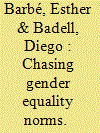

|
|
|
|
|
| Summary/Abstract |
This article studies Sexual and Reproductive Health and Rights (SRHR) at the United Nations (UN). SRHR, a gender equality norm that applies human rights to sexuality and reproduction, have traditionally been supported by a network of actors led by the United States (US) and the European Union. Nevertheless, a rival network has contested SRHR since their conception in the early 1990s. We study the robustness of SRHR in five UN fora between 2009 and 2020, focusing on actor constellations, productive power and norm concordance. Between 2009 and 2016, the normative status quo was maintained, except in the Human Rights Council and the Security Council. In 2017, the US joined the network of rivals and accelerated the norm’s weakening in the Security Council and the Commission on Population and Development. However, to weaken or strengthen the norm further, both networks see a need to address SRHR outside the UN.
|
|
|
|
|
|
|
|
|
|
|
|
|
|
|
|
| 14 |
ID:
184394
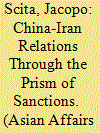

|
|
|
|
|
| Summary/Abstract |
The article aims to understand how China has dealt with the puzzle of Iran's sanctions. Beijing's approach and reaction to the question of sanctioning Tehran and abiding by the sanctions imposed by the United States and the UNSC are a response to a complex matrix formed by three distinct but co-existing dimensions: the bilateral relationship with Iran, that with Washington, and its own positioning within the international community. Each dimension is associated with the performance of a specific international role. What emerges from the analysis of three case studies – the introduction of the 1996 Iran and Libya Sanction Act, the UNSC resolutions imposing sanctions on Iran (2006-10), and the response to Washington's Maximum Pressure campaign – is that, for China, Iran's sanctions are an inherent source of conflicts between its roles. Ultimately, Beijing's responses to the emerging conflicts between its roles have been cautious and aimed at tempering their possible escalations, even though the case studies show that a quite visible hierarchy of roles exists. China's role vis-à-vis Iran occupies a lower position than those performed vis-à-vis the United States and the international community.
|
|
|
|
|
|
|
|
|
|
|
|
|
|
|
|
| 15 |
ID:
092710
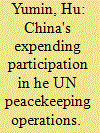

|
|
|
| 16 |
ID:
107838
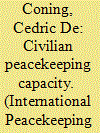

|
|
|
|
|
| Publication |
2011.
|
| Summary/Abstract |
The timely deployment of suitably qualified civilian personnel is a challenge that none of the organizations that deploy peacekeepers has yet addressed. This challenge has floundered on the periphery of the peacekeeping debate for many years, but a 2010-11 UN civilian capacity review provides a unique opportunity to focus attention on the problem. This article proposes the formation of a global civilian capacity partnership that brings together the training and roster community, the UN Secretariat and a grouping of interested states, with the aim of significantly improving the UN Secretariat's ability to identify, recruit and deploy suitably qualified civilian personnel in a reasonable time, and without adverse side effects for the local community or the mission mandate.
|
|
|
|
|
|
|
|
|
|
|
|
|
|
|
|
| 17 |
ID:
185890
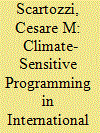

|
|
|
|
|
| Summary/Abstract |
Over the past three decades, United Nations (UN) Peace Operations have become increasingly multidimensional and integrated. Blue helmets, originally deployed to provide security and enforce cease-fires, are now engaging in multi-domain activities aimed at sustaining long-term peace. As part of this trend, the UN Security Council has begun mandating Peacekeeping Operations (PKOs) and Special Political Missions (SPMs) to engage in climate-sensitive programming. Questions, however, remain over the effectiveness of climate-related activities in peace operations. This study, using a large textual dataset, provides a comprehensive assessment and evaluation of the state of climate-sensitive programming in PKOs and SPMs. The findings indicate that while mandates and programming activities related to climate change have been on the rise, most field operations have failed to integrate climate-sensitive programming into their work. Moreover, the agenda on climate security appears to have led to a process of institutional decoupling between organizational arrangements and field activities.
|
|
|
|
|
|
|
|
|
|
|
|
|
|
|
|
| 18 |
ID:
046812
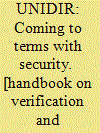

|
|
|
|
|
| Publication |
Geneva, UNIDIR, 2003.
|
| Description |
xi, 146p., xi, 159p.
|
| Standard Number |
9290451491
|
|
|
|
|
|
|
|
|
|
|
|
Copies: C:1/I:0,R:0,Q:0
Circulation
| Accession# | Call# | Current Location | Status | Policy | Location |
| 046845 | 355.03/UNI 046845 | Main | On Shelf | General | |
|
|
|
|
| 19 |
ID:
156859
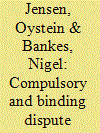

|
|
|
| 20 |
ID:
108253
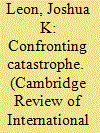

|
|
|
|
|
| Publication |
2011.
|
| Summary/Abstract |
Social environments played a powerful role in the institutional adaptations of the AIDS fighting agencies within the United Nations system. Since its AIDS apparatus has become operational, the UN has undertaken two major strategic shifts. The first shift saw the dissolution of the GPA, a small subunit of the WHO in favour of UNAIDS, a dedicated agency engaged in global advocacy. This shift involved a controversial bureaucratic process that led, finally, to a more human rights-based approach to the disease. The second shift saw an increased emphasis on ground-level efficiency. What caused these changes? Contributions in the rationalist tradition expect the UN to act as a multilateral goal-seeker looking to optimally address a major gap in global governance. A sociological framework sees normative changes within the UN as catalysts for change in its goals and structure. A synthesis of these traditions conceptualizes the UN's strategic shifts more clearly, capturing the interactive process between the organization and its strategic environment. UN agencies were forced to rationally adapt to changing conditions in prevailing AIDS norms.
|
|
|
|
|
|
|
|
|
|
|
|
|
|
|
|
|
|
|
|
|